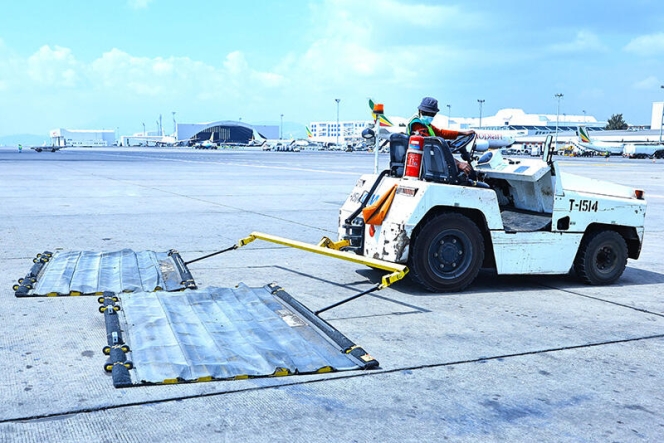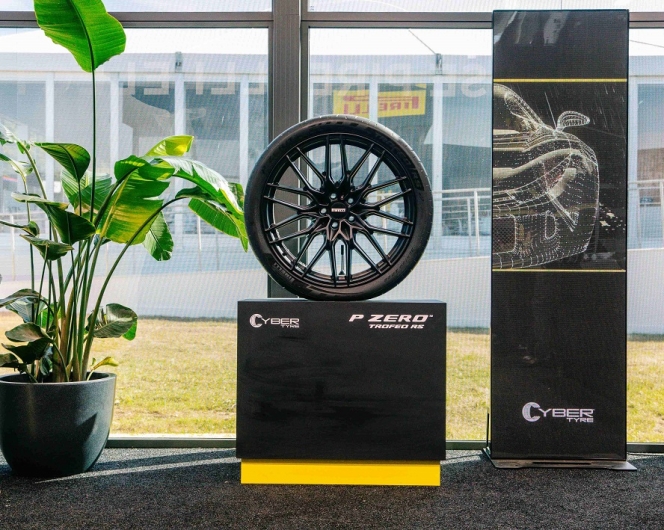Bridgestone Unveils BATTLAX RACING STREET RS12 Motorcycle Tyre
- By TT News
- November 03, 2025
Bridgestone has confirmed a January 2026 launch for its new premium sports motorcycle tyre, the BATTLAX RACING STREET RS12, in North America. Developed under the concept ‘From Circuit to Street,’ this road-legal tyre is engineered to deliver the highest level of dry grip within the BATTLAX lineup by directly incorporating technologies refined in competitive racing.
The RS12 features a specialised compound derived from race tyre development, which works in concert with a newly designed tread pattern. This pattern’s optimised groove ratio enhances overall tyre rigidity and increases the contact area during cornering for superior grip. A significant innovation for the front tyre is the introduction of the HE-MS BELT structure, a technology previously reserved for top-tier global motorcycle races. This flexible belt system equalises contact pressure to provide a further boost in traction.
By integrating these endurance-racing technologies, the RS12 achieves comprehensive performance improvements on the circuit, with a primary focus on dry conditions. The result is a notable reduction in lap times compared to its predecessor, the RS11. Furthermore, the synergistic combination of its compound, pattern and structure ensures that the high grip level is consistently maintained over multiple laps, resisting performance degradation. This gives riders confidence and a more engaging experience across diverse riding scenarios, from aggressive sport riding on dry pavement to tackling winding roads and dedicated track days.
TGL Season 2 Kicks Off With Hankook As Founding And Official Tire Partner
- By TT News
- December 29, 2025

The second season of TGL Presented by SoFi, where Hankook Tire serves as the Founding and Official Tire Partner, commenced on 28 December 2025. This innovative league, a venture of TMRW Sports with backing from icons like Tiger Woods and Rory McIlroy, represents a strategic alignment for Hankook, uniting two entities driven by technological advancement. The partnership provides a global platform to reinforce Hankook's premium brand positioning across North America and worldwide through extensive visibility during broadcasts and at the state-of-the-art SoFi Center in Florida.
This unique venue embodies the league's fusion of sport and technology, featuring a massive simulator with a dedicated ScreenZone and a dynamic GreenZone. This area, equipped with a turntable and over 600 actuators, meticulously replicates real-world golf conditions indoors, creating an immersive arena experience. The competition itself is fast-paced and engaging, with teams of PGA TOUR players competing in Triples and Singles sessions over 15 holes. Innovative elements like the point-doubling ‘Hammer’, real-time strategy via ‘Hot Mic’ and a Shot Clock ensure a dynamic spectacle for fans.
The season opener presented a compelling narrative as a rematch of the inaugural finals, pitting the undefeated Atlanta Drive GC, featuring Justin Thomas and Patrick Cantlay, against a determined New York Golf Club squad led by Matt Fitzpatrick and Xander Schauffele. This match set the tone for an intensive season running through March, where six teams and 24 top golfers will compete. For Hankook, this partnership is more than signage; it is an active engagement with a global community, delivering a distinctive brand experience that bridges cutting-edge mobility and sport for enthusiasts everywhere.
Dunlop Secures CDP ‘A List’ Recognition For Climate Change And Water Security
- By TT News
- December 29, 2025

Dunlop (company name: Sumitomo Rubber Industries, Ltd.) has made its way to the annual A-List of CDP for climate change and water security. This premier designation, awarded for the first time to the company in the 2025 evaluation, recognises world-leading performance in transparency, risk management and environmental action. CDP’s annual assessment is a key benchmark for corporate sustainability across climate, water and forests.
This achievement stems from the Group’s integrated approach to material issues outlined in its corporate philosophy. It treats the interconnected challenges of climate change, biodiversity and the circular economy holistically, advancing concrete initiatives under its long-term ‘Driving Our Future’ sustainability policy.
On climate, the Group’s science-based emission reduction targets for 2030 are validated by the Science Based Targets initiative. Operational efforts include pioneering green hydrogen production at its Shirakawa Factory and developing tyres made entirely from sustainable materials by 2050. The company also works to reduce emissions across its supply chain, lowers tyre rolling resistance to improve vehicle fuel economy and extends product life through retreading.
For water security, the strategy is driven by localised risk assessments at global production sites. In seven facilities identified as high-risk, the goal is to achieve 100 percent wastewater recycling by 2050. Progress is already evident, with the company’s Thailand factory reaching full wastewater recycling in 2024.
These coordinated actions on multiple environmental fronts formed the basis for the Group’s simultaneous top-tier recognition in both critical categories from CDP.
Bridgestone Launches Co-Creation Initiative With Ethiopian Airlines Group
- By TT News
- December 29, 2025

Bridgestone Corporation has initiated a novel co-creation programme in partnership with Ethiopian Airlines and Ethiopian Airports, focused on enhancing aviation safety at Addis Ababa Bole International Airport. This marks Bridgestone’s first sustained three-way collaboration with both an airline and an airport authority, targeting the reduction of Foreign Object Debris on runways and taxiways to support safer and more reliable aircraft operations.
The project was prompted by tyre-related incidents linked to debris at the airport, which previously risked disrupting flight schedules. Leveraging its specialised system for inspecting used airline tyres and analysing debris data, Bridgestone assessed conditions at the hub and proposed a tailored action plan. The company provided continuous support by analysing debris distribution patterns, developing visual hazard maps, advising on efficient collection methods and conducting training to raise awareness among airport personnel.
These sustained efforts have yielded significant results, substantially lowering the rate of tyre damage caused by runway debris compared to levels before the collaboration began. This reduction has supported improved on-time performance for Ethiopian Airlines while advancing overall operational safety. Additionally, the initiative has encouraged greater use of retreaded tyres, promoting economic efficiency and environmental sustainability within the airline’s operations.
Looking ahead, Bridgestone and Ethiopian Airlines Group plan to deepen their co-creation efforts, aiming to generate further value for the aviation sector and broader society through continued innovation and partnership.
Retta Melaku, Chief Operating Officer, Ethiopian Airlines, said, "At Ethiopian Airlines, the safety of our passengers, employees and aircraft is a priority. We are pleased to collaborate with Bridgestone to further strengthen our efforts in reducing FOD at Addis Ababa Bole International Airport and ensure safe operations at the hub airport."
Getaneh Adera, Managing Director, Ethiopian Airports, said, "We remain fully committed to upholding the highest safety standards at Bole International Airport at all times. This significant achievement in reducing FOD is the result of our strong commitment for safe operations and close collaboration with Bridgestone. Through our co-creation activities, we are pleased to have realised safer operations with enhanced productivity and economic value."
Jean-Philippe Minet, Managing Director, Bridgestone Aircraft Tire (Europe) S.A., said, "By combining the learnings and insights from Ethiopian Airlines' operational issues with our analysis technology and know-how, we have deepened our co-creation to propose customised solutions. We are delighted to contribute to safe aircraft operations with peace of mind and to improved operational productivity through the co-creation of efficient FOD reduction on airport surfaces. Through further expansion and evolution of this solution, we will amplify the value of our ‘Dan-Totsu Products’, trust with our customers and value of the data for creating new value."
Pirelli Cyber Tyre Sweeps International Awards For Safety Innovation
- By TT News
- December 27, 2025

Following a wave of international acclaim, Pirelli's Cyber Tyre technology continues to redefine automotive safety and connectivity, earning a trio of prestigious awards that underscore its transformative impact. The recognition began in France, where a panel of 20 industry experts at the Automobile Awards honoured the Cyber Tyre with the Safety Award for its ability to enhance vehicle security. This intelligent system employs integrated sensors that communicate with a car’s electronic control unit, delivering real-time road data. This allows vehicle stability systems to react more precisely, improving braking and handling, while also sharing critical information with road infrastructure and other connected vehicles to proactively alert of hazards.
Further acclaim came from Autobest, a European automotive jury representing 32 countries, which granted its SafetyBest 2026 award. This honour celebrates the pioneering development of the Cyber Tyre, a technology deemed of exceptional significance for raising road safety standards following rigorous evaluation. Simultaneously, the global market analysis firm Frost & Sullivan named Pirelli the 2025 Company of the Year in the smart automotive tyre sector. This award highlights Pirelli’s foresight in anticipating industry trends and bringing groundbreaking innovations to market that generate substantial value.
The culmination of two decades of development, Cyber Tyre technology is now moving from concept to real-world application through key automotive partnerships. Following its 2021 debut on the McLaren Artura, the system has been adopted by Audi for a special track model and is fully integrated into the electronics of the Pagani Utopia Roadster. A recently announced agreement with Aston Martin will see the technology featured on future models, with development also expanding into the premium volume market. These implementations are supported by a strategic collaboration with Bosch, ensuring seamless integration with essential vehicle systems like ESP and ABS.
Fundamentally, the Pirelli Cyber Tyre is an integrated hardware and software platform. It collects vital data on tyre pressure, temperature and dynamics, processes this information via proprietary algorithms and communicates instantly with a vehicle’s driver-assistance and stability controls. This elevates safety, efficiency and comfort. Its influence extends beyond the vehicle itself, contributing to smarter infrastructure. A pilot project in Italy’s Apulia region, for example, combines tyre sensor data with camera imagery to create dynamic road maps that monitor pavement conditions and aid maintenance planning. Through Vehicle-to-Everything connectivity, the Cyber Tyre is paving the way for smarter roads and cities, marking a decisive step towards future mobility by transforming the traditional tyre into a connected, intelligent component.
Andrea Casaluci, CEO, Pirelli, said, “These new recognitions confirm that the role of the tyre has changed. For over a century, the technologies inside it have been evolving, but its function has remained the same: conveying forces to the ground to ensure vehicle control. Today, the tyre continues to evolve, and to its primary purpose a new one has been added: thanks to Pirelli Cyber™ Tyre, it has begun to collect and transmit data, processed through algorithms developed by Pirelli. These enable new functionalities, both within vehicle electronics and in relation to road infrastructure, with development potential that looks towards smart cities and autonomous driving. Digitalisation and connectivity are essential pillars for designing future mobility, and our technology – the first of its kind in the tyre world – has embraced them, as confirmed by these awards and by our collaborations with leading car manufacturers.”







Comments (0)
ADD COMMENT